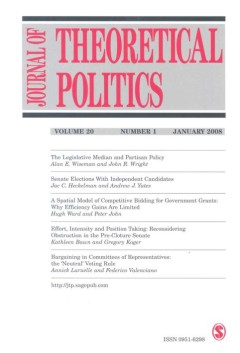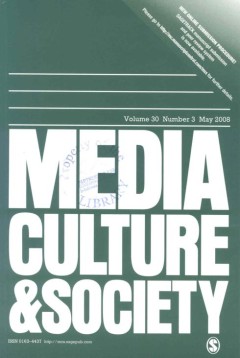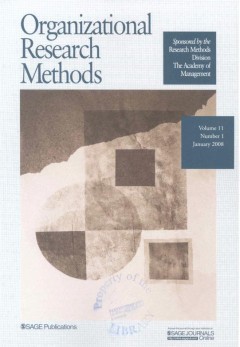Filter by

Reconstructing Empirical Public Administration: Lutonism or Scientific Realism?
- Edition
- Vol. 40, No. 3 Page 324-330
- ISBN/ISSN
- 0095-3997
- Collation
- -
- Series Title
- Administration & Society
- Call Number
- -
- Edition
- Vol. 40, No. 3 Page 324-330
- ISBN/ISSN
- 0095-3997
- Collation
- -
- Series Title
- Administration & Society
- Call Number
- -

Implementing Interagency Collaborations: Exploring Variation in Collaborative…
Collaborative mechanisms are increasingly being used to deliver public services in the United States, with many scholars seeking to understand the operation and impact of these ventures. This article contributes to this research by breaking apart interagency collaborations used to deliver services, demonstrating the variations that can occur within a single form of collaborative service deliver…
- Edition
- Vol. 40, No. 3, Page 298-323
- ISBN/ISSN
- 0095-3997
- Collation
- -
- Series Title
- Administration & Society
- Call Number
- -

The Development of Public Institutions: Reconsidering the Role of Leadership
Some public organizations take on the qualities and characteristics of an institution. They become vessels for societal ambition, combining reliable performance with high levels of legitimacy. The functioning and effects of these highly institutionalized organizations are well researched. How these public institutions come about remains somewhat of a mystery, however. Empirical accounts of publ…
- Edition
- Vol. 40, No. 3, Page 271-297
- ISBN/ISSN
- 0095-3997
- Collation
- -
- Series Title
- Administration & Society
- Call Number
- -

John Locke and Public Administration
John Locke, whose thought greatly influenced the American founding, makes an important contribution to contemporary public administration theory and to our understanding of the history of American public administration. Locke's theory gives an account of why it is legitimate for public administrators to sometimes perform functions that are legislative or judicial in nature and encourages public…
- Edition
- Vol. 40, No. 3, Page 253-270
- ISBN/ISSN
- 0095-3997
- Collation
- -
- Series Title
- Administration & Society
- Call Number
- -

Beyond Empiricists Versus Postmodernists
- Edition
- Vol. 40, No. 2, Page 211-219
- ISBN/ISSN
- 0095-3997
- Collation
- -
- Series Title
- Administration & Society
- Call Number
- -
- Edition
- Vol. 40, No. 2, Page 211-219
- ISBN/ISSN
- 0095-3997
- Collation
- -
- Series Title
- Administration & Society
- Call Number
- -

Decision Making in a Time of Significant Reform
This article utilizes three empirical studies to examine the organizational and policy context within which health managers find themselves today, asking three questions of extreme relevance for the area of health organizational reform in a period in which the pace and scope of change are intense: What strategies do public service managers employ to make sure they stay up to date with what is r…
- Edition
- Vol. 40, No. 2, 194-210
- ISBN/ISSN
- 0095-3997
- Collation
- -
- Series Title
- Administration & Society
- Call Number
- -

Social Welfare Contracts as Networks : The Impact of Network Stability on Man…
This analysis of state social service contracts identifies sources of system instability and explores the impacts of instability on service delivery networks. The authors examine social welfare service contracts explicitly as networks and assess the effects of network instability on the management of contracts, contract effectiveness, the performance of network organizations, and clients. They …
- Edition
- Vol. 40, No. 2, 115-146
- ISBN/ISSN
- 0095-3997
- Collation
- -
- Series Title
- Administration & Society
- Call Number
- -

Researching "Back Home": International Management Research as Autoethnography
The challenges facing international management researchers conducting research in foreign contexts are increasingly well understood. However, for a growing group of researchers, the problem is very different: Rather than being foreign researchers researching in an unfamiliar context, they are insiders conducting research in their own cultural context for publication in international journals. I…
- Edition
- Vol. 11, No. 3, Page 541-561
- ISBN/ISSN
- 1094-4281
- Collation
- -
- Series Title
- Organizational Research Methods
- Call Number
- -

Persuasion through insult: the `f' word in Israeli media
This article is concerned with the rampant use of a particular cultural frame - freier (roughly "sucker") - in Israeli media. In this culture, the term is an unmitigated personal insult, and indeed has come to represent a threat to national identity. Nonetheless, it is widely used as a persuasive tactic in commercial, social and political rhetoric. The analysis of several hundred persuasive mes…
- Edition
- Vol. 30, No. 2, Page 239-256
- ISBN/ISSN
- 0163-4437
- Collation
- -
- Series Title
- Media, Culture & Society
- Call Number
- -

DAB: the future of radio? The development of digital radio in four European c…
In common with most media and consumer technologies, radio is migrating from analogue to digital operation. Europe was the first region of the world to develop a digital replacement for traditional analogue broadcast radio. The Digital Audio Broadcasting (DAB) project began in 1987 and the first domestic DAB broadcasts began in 1995. However, DAB has made less progress than originally anticipat…
- Edition
- Vol. 30, No. 2, Page 151-166
- ISBN/ISSN
- 0163-4437
- Collation
- -
- Series Title
- Media, Culture & Society
- Call Number
- -

Global citizenship as show business: the cultural politics of Make Poverty Hi…
What does global citizenship mean to citizens of a liberal democratic capitalist state? As part of an historically unprecedented, globally coordinated, NGO-led campaign against poverty in the underdeveloped south, "Make Poverty History" attempted to give this question an answer. Cultural politics was integral to the campaign. Make Poverty History was not only mediated (as all campaign must ber)…
- Edition
- Vol. 30, No. 2, Page 167-181
- ISBN/ISSN
- 0163-4437
- Collation
- -
- Series Title
- Media, Culture & Society
- Call Number
- -

"It kind of gives you that vintage feel": vinyl records and the trope of death
Vinyl records continue to be coveted and collected by loyal fans, despite the success of new technologies such as compact discs and MP#s. This article evaluates the evolution of records' cultural meanings, explaining the value these artifacts hold record collectors. Using archival analysis and in-depth interviews to analyse both historical and contemporary discourses surrounding records, we fin…
- Edition
- Vol. 30, No. 2, Page 183-195
- ISBN/ISSN
- 0163-4437
- Collation
- -
- Series Title
- Media, Culture & Society
- Call Number
- -

Character, audience agency and transmedia drama
Changes in the television industry with regards to the development of new media technologies are having a significant impact on audiences' engagement with television drama. This article explore how games can be used to extend audience engagement with audio-visual fiction onto a range of technological platforms to the point where "television" drama should increasingly be considered as "transmedi…
- Edition
- Vol. 30, No. 2, Page 197-213
- ISBN/ISSN
- 0163-4437
- Collation
- -
- Series Title
- Media, Culture & Society
- Call Number
- -

Electoral Poaching and Party Identification
This article studies electoral competition in a model of redistributive politics with deterministic voting and heterogeneous voter loyalties to political parties. We construct a natural measure of `party strength' based on the sizes and intensities of a party's loyal voter segments and demonstrate how party behavior varies with the two parties' strengths. In equilibrium, parties target or `poac…
- Edition
- Vol. 20, No. 3, Page 275-302
- ISBN/ISSN
- 0951-6298
- Collation
- -
- Series Title
- Journal of Theoretical Politics
- Call Number
- -

Applying the Methodology of Mechanism Design To the Choice of Electoral Systems
In this article we inquire into the strategic intent behind the design of election laws. Presuming that institutional designers are strategic and rational, we identify the extent of information incompleteness as determining their objectives for rule choice. For different levels of information incompleteness, we assess empirically the validity of explaining actual choices with designers' elector…
- Edition
- Vol. 20, No. 3, Page 303-327
- ISBN/ISSN
- 0951-6298
- Collation
- -
- Series Title
- Journal of Theoretical Politics
- Call Number
- -

Bribery and Favoritism in Queuing Models of Rationed Resource Allocation
Queuing mechanisms are commonly used in developing countries and in transition economies to allocate goods characterized by excess demand to citizens. Bribery and favoritism frequently accompany the use of such queuing mechanisms. Therefore, we first analyze a queuing model of resource allocation with bribery. Specifically, we determine the expected wait time of a citizen from the time he arriv…
- Edition
- Vol. 20, No. 3, Page 329-338
- ISBN/ISSN
- 0951-6298
- Collation
- -
- Series Title
- Journal of Theoretical Politics
- Call Number
- -

Foundations of Legislative Organization and Committee Influence
We revisit seemingly settled questions of legislative organization, specifying a more general, realistic, informational model than previously. While theorists, unlike empiricists, have commonly inferred that the floor lacks incentive to allow committee influence via gatekeeping, we find otherwise. By assuming that (1) legislators know more about the status quo than alternative proposals, …
- Edition
- Vol. 20, No. 3, Page 339-374
- ISBN/ISSN
- 0951-6298
- Collation
- -
- Series Title
- Journal of Theoretical Politics
- Call Number
- -

Working With Pluralism: Determining Quality in Qualitative Research
This Feature Topic contains four articles that address the determination of quality in qualitative research by exploring the use of criteria from the perspective of reviewers, editors, and/ or authors. In this introductory article, the authors assert that these explorations represent an important move away from employing listings of static criteria to adjudicate and develop qualitative research…
- Edition
- Vol. 11, No. 3, Page 419-429
- ISBN/ISSN
- 1094-4281
- Collation
- -
- Series Title
- Organizational Research Methods
- Call Number
- -

The Philosophy and Politics of Quality in Qualitative Organizational Research
Within this article, the authors outline the political and institutional structures that work to formulate operating norms that govern what is considered to be ``acceptable'' qualitative organizational research, and the quality indicators attached to foundational, quasi-foundational, and nonfoundational research orientations. They argue that encouraging a plurality of methods and representation…
- Edition
- Vol. 11, No. 3, Page 456-480
- ISBN/ISSN
- 1094-4281
- Collation
- -
- Series Title
- Organizational Research Methods
- Call Number
- -

Fitting Oval Pegs Into Round Holes: Tensions in Evaluating and Publishing Qua…
A study of qualitative researchers who have submitted and/or published their research in top-tier North American organizational and management journals reveals the evaluative criteria-in-use at these journals. Specifically, when asked to take the perspective of an (a) author, (b) evaluator (reviewer or editor), and (c) judge of the comparisons between qualitative and quantitative research, thre…
- Edition
- Vol. 11, No. 3, Page 481-509
- ISBN/ISSN
- 1094-4281
- Collation
- -
- Series Title
- Organizational Research Methods
- Call Number
- -
 Computer Science, Information & General Works
Computer Science, Information & General Works  Philosophy & Psychology
Philosophy & Psychology  Religion
Religion  Social Sciences
Social Sciences  Language
Language  Pure Science
Pure Science  Applied Sciences
Applied Sciences  Art & Recreation
Art & Recreation  Literature
Literature  History & Geography
History & Geography